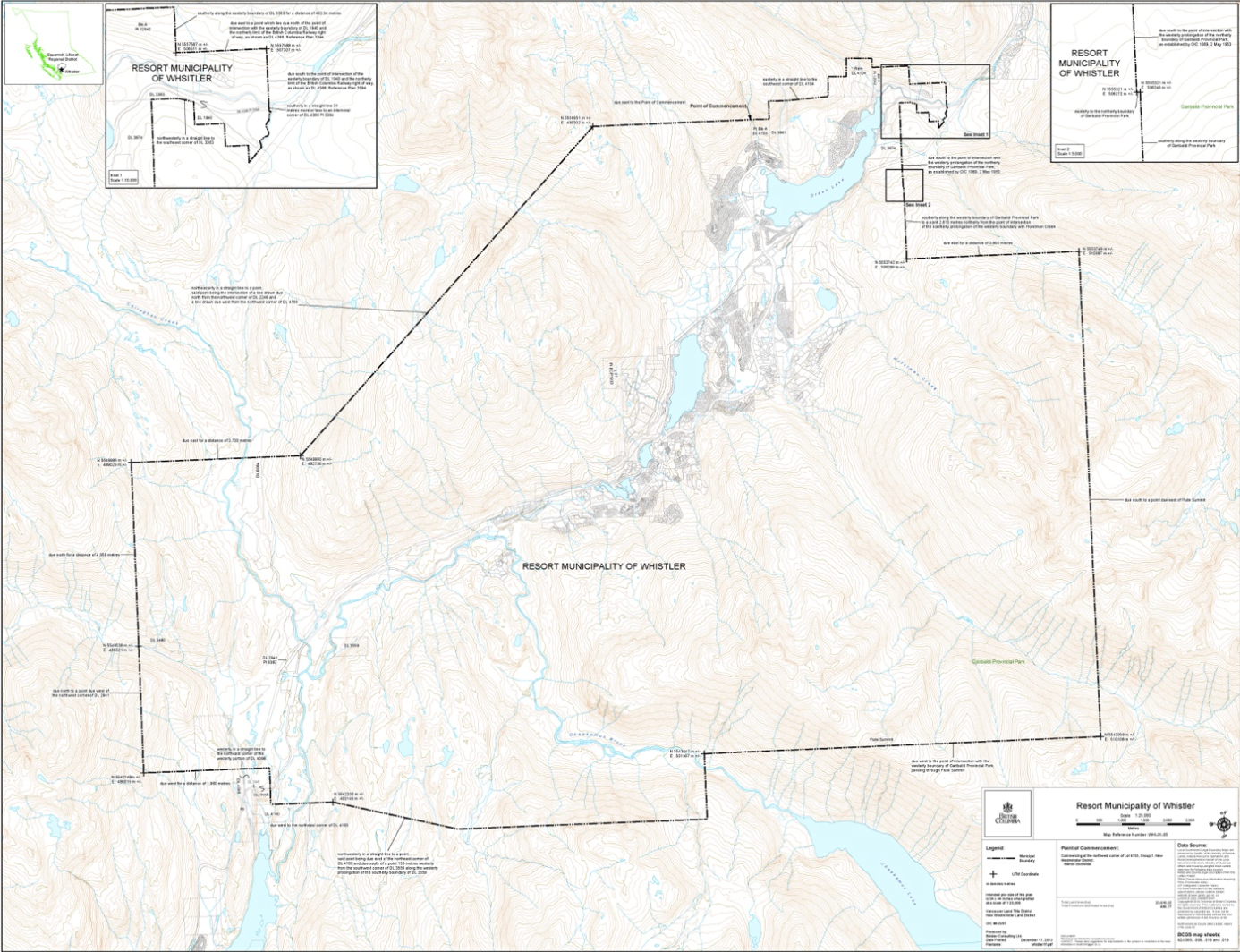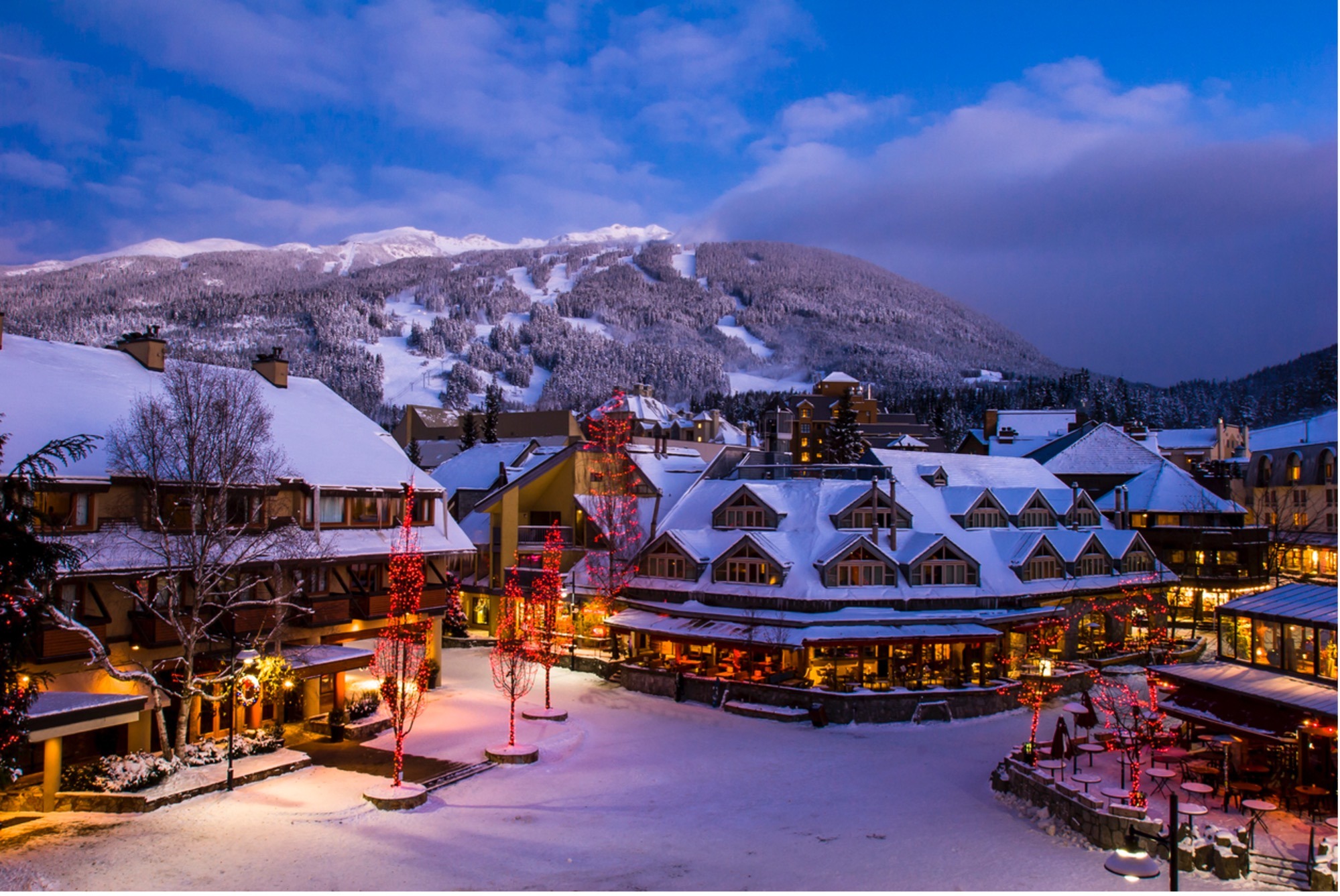Resort Municipality of Whistler
Whistler’s Geographical Background
Municipality Boundaries:
The Resort Municipality of Whistler spans from the northern tip of Garibaldi Provincial Park to the southern end of the Callaghan Valley and is bordered by the Coast Mountains.

Major Land or Waterway Features:
-
Mountains: Whistler Mountain, Blackcomb Mountain, Rainbow Mountain.
-
Lakes: Lost Lake, Alta Lake, Green Lake, Nita Lake.
-
Rivers: Fitzsimmons Creek, Cheakamus River.
-
Forests: Dense alpine and coastal forests dominate the region.
-
Other: Garibaldi Provincial Park (major protected area nearby).
Climate Type:
- Whistler’s ski area gets about 11.91 meters of snow each year. Thanks to its location near the coast, winter temperatures are mild. In Whistler Village, the average low during winter is around -5°C. The rest of the year, Whistler is perfect for activities like mountain biking, hiking, golf, fishing, canoeing, and kayaking. In summer, especially in July and August, temperatures often hit a comfy average high of 27°C.
Whistler’s Economic and Social Background
Total Population:
- The population of Whistler is 13,982 residents (2021), though it fluctuates significantly due to seasonal workers and tourists.
Community Composition (Income, Language, Age):
-
Income: Median total income of household in 2020 was $99,000.
-
Language: Majority speak English (13,245.) Second language is French.
-
Age: Young working-age adults dominate (20–45 years), influenced by the resort
economy and transient workforce.
Major Industries and Employers:
-
Industries: Tourism, being its primary industry. Hospitality, real estate, and outdoor recreation are other industries that are part of Whistler’s diversified marketplace.
-
Employers: Whistler Blackcomb Resort, Crystal Lodge hotel, Hilton Whistler Resort & Spa, Avesta Strata and Property Management, Lancaro Inc., municipal government, and tourism-related businesses.
Whistler's Political Governance
Date of Municipal Incorporation:
- Whistler was officially incorporated as a Resort Municipality on September 6, 1975.
Mayor and Council Members:
- Mayor Jack Crompton
-
Councillor Arthur De Jong
604-935-8225 | adejong@whistler.ca | LinkedIn -
Councillor Cathy Jewett
604-935-8227 | cjewett@whistler.ca | LinkedIn -
Councillor Jessie Morden
604-935-8228 | jmorden@whistler.ca | Instragram -
Councillor Jen Ford
604-935-8226 | jford@whistler.ca | Facebook -
Councillor Jeff Murl
604-935-8230 | jmurl@whistler.ca | LinkedIn -
Councillor Ralph Forsyth
604-935-8229 | rforsyth@whistler.ca | X -
Corporate Coordinator: Julie Farr
(liaison to the Chief Administrative Officer, Virginia Cullen) 604-935-8103 | jfarr@whistler.ca | LinkedIn
604-935-8101 | jcrompton@whistler.ca | X
School Board Members:
-
Cynthia Higgins Vice Chair | chiggins@sd48.bc.ca
-
Rachael Lythe Trustee | rlythe@sd48.bc.ca
Bordering Indigenous Nations:
- Whistler is within the Squamish Nation and Lil’wat Nation territories.
Media Scan Resort Municipality of Whistler
- On March 2020 the Resort Municipality of Whistler activated its emergency operation centre in response to rising COVID-19 cases in B.C. and the closure of Whistler Blackcomb. Mayor Jack Crompton emphasized the need for coordinated efforts and clear communication with public health officials. This story highlights the challenges of managing public health in a small, tourism-dependant community. While this news story emphasizes on health issues, it raises some questions about the long-term economic impact on local businesses, the effectiveness of the emergency measures implemented, and the community response. This story matters because it addresses public safety, potential economic backlash and community resilience.
- Tina Pashumanti James, a local business owner and yoga teacher, ran for a seat on Whistler’s council in the Oct. 15 municipal elections. James, who has lived in Whistler for 19 years, has experienced homelessness firsthand while running her on business. Motivated by the town’s ongoing house crisis, she hoped to address the issue of affordable housing, mental health, and labour shortages. Her platform included creating designated spaces for people living in vehicles, restricting short-term rentals, and improving collaboration with local First Nations. The story is important as it showcases a candidate’s personal connection to the town’s significant issues and how citizens interact with their system of governance. This story raises the question about its plan for funding and time of execution.
- Antony Vo, convicted for his involvement in the January 6, 2021 U.S. Capitol riot, was arrested in Whistler, B.C., exactly 4 years later after the incident, as he sought asylum in Canada instead of reporting to jail. Vo had hoped the U.S. President Donald Trump would fulfill a promise to pardon him and was attempting to escape a nine-month prison sentence. The Canada Border Services Agency detained him under the Immigration and Refugee Protection Act after he entered illegally. No record of Vo entering through official port of entries can be found in the agency. This story raises questions about the Canada’s border agency’s ability to background check individuals’ controversial pasts. The story is important because in links immigration law, politics, and international relations, making it a significant issue for legal experts and the public.
In their own words
When you walk around Whistler, what are some of the issues in the community that might be concerning to you?
Ralph Forsyth, council member:
“We're a tourist resort, so I think we do an amazing job of welcoming people. And the resort obviously is very successful. It's the most successful tourism destination in British Columbia. But the resort has grown, like the population has grown tremendously since 2010. That's brought a lot of change and a lot of pressures on the community that maybe didn't exist in the same way before. So, for example, we built an amazing recreation center, like swimming pool, gym, racquet, squash courts, everything, in 1994 when the population was only 6,000 people. It was all first class, but now it's sort of bursting at the seams because there's 16,000. So that's one example of how growth has put pressure on things in the community.”
Arthur De Jong, council member:
“Well, physically, the climate, 100 per cent. Our winters are warmer. Most of our summers are drier. Our ecosystems are changing. So that's physically. Community-wise? We've had a lot of our original leaders pass away. And so, people like me have a job to mentor our young leaders and continue to strive to be the best mountain resort community on the planet we were once. And it's complicated how to explain all of that, but reinvigorate our leadership. We were recognized all over the world for our work with the environment, with our excellence in ski operations, our hosting of the Olympics. We had a lot of success here. And how do we reignite that drive?”
